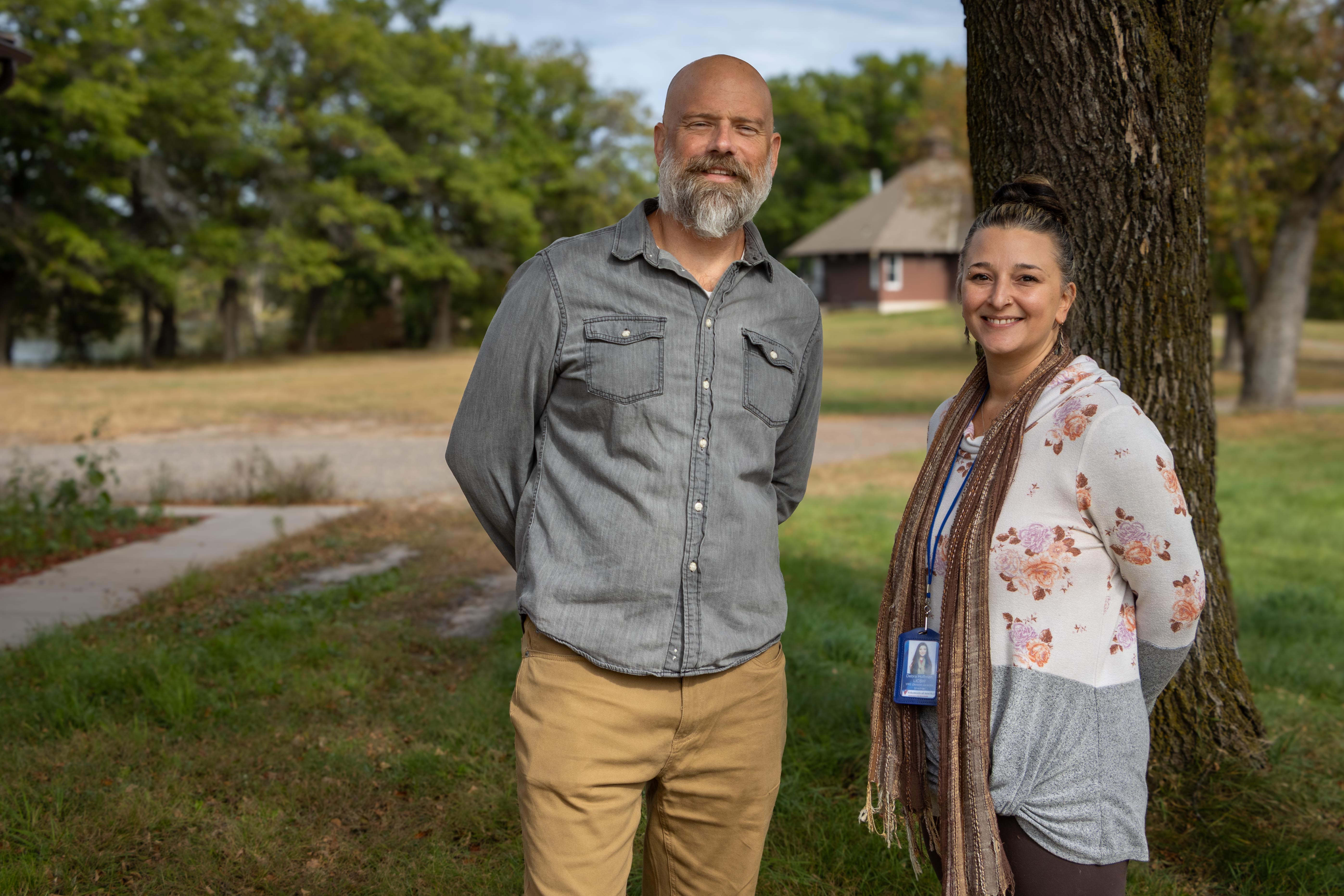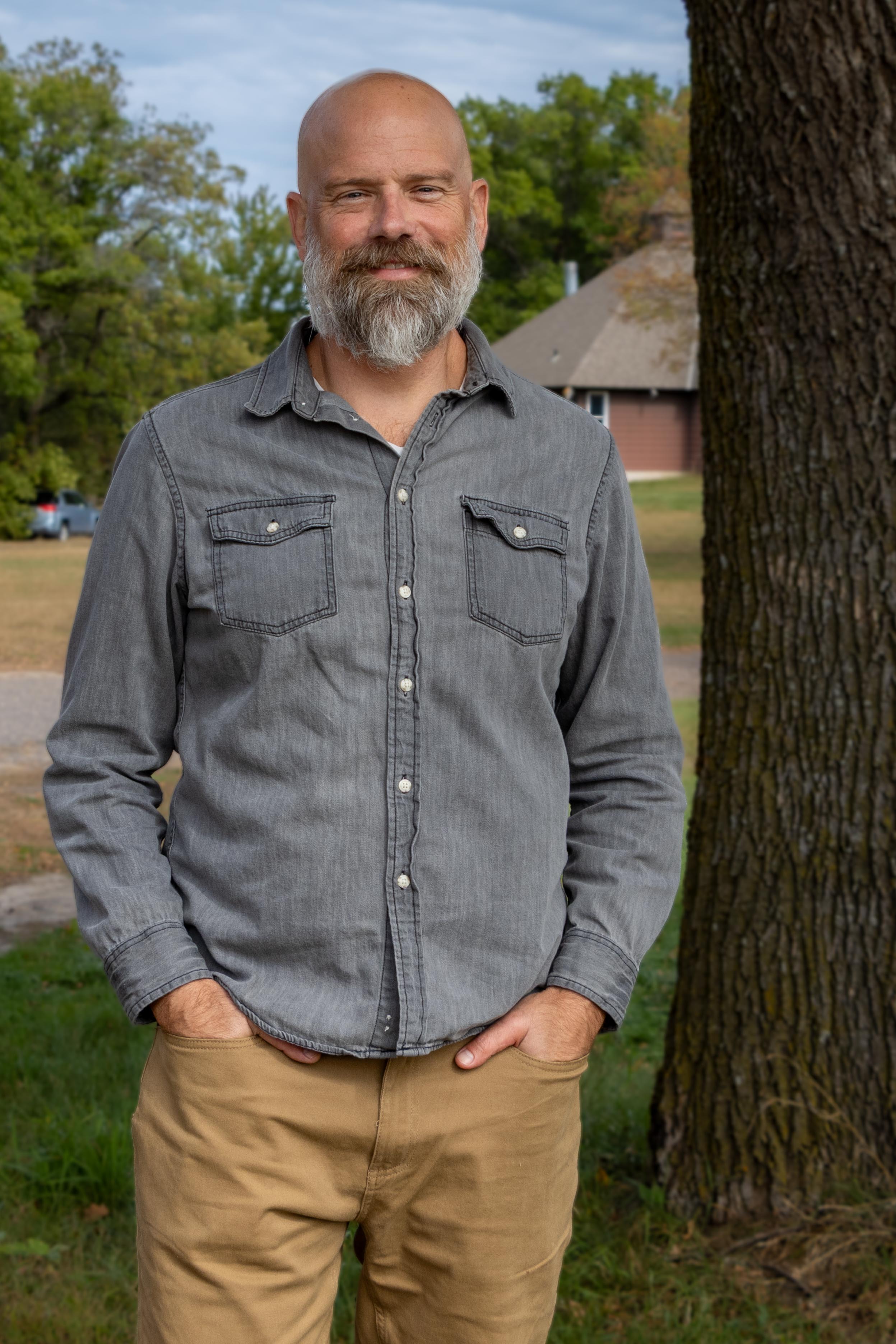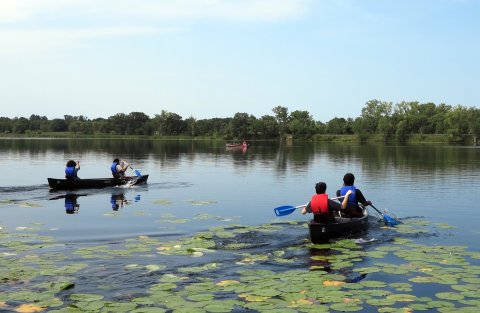When Chaplain Mike Rusert steps onto the grounds of the Bar None campus, he brings with him years of experience—and a heart committed to healing, spiritual care, and compassion.
“Spiritual care looks like creating and holding a space for healing, freedom, and creativity,” Mike shares.
“It’s about shaping an environment—through genuine curiosity and care—where people sense it’s okay for them to be right where they are. People need to know they’re not going to be judged for what they’ve suffered or done. This allows them to be honest. It opens them to a more compassionate and empowering understanding of their life story and expands their imagination for the story they get to write moving forward.”
Bar None is one of two VOA MN/WI Youth Residential Services (YRS) campuses. YRS provides a nurturing, skill-building environment where youth navigating emotional and behavioral challenges begin healing from trauma. Through individualized care, therapeutic support, and structured programming, youth rebuild their lives with the tools they need to thrive.
Mike’s role at Bar None is a part of his Social Justice Clinical Pastoral Education (SJ CPE) unit. SJ CPE brings together incarcerated men and “outside” students for a transformative educational experience. Students learn together at weekly sessions within Minnesota Correctional Facility-Faribault and put their learnings into action, serving as spiritual care providers either inside the prison or in the community.

Mike’s journey—including previous work with refugees and within correctional settings—has deepened his insight, empathy, and connection. His experiences are interwoven with the SJ CPE program, “CPE has opened my eyes to just how much is possible for any human being,” Mike reflects. “No matter their circumstances—what they’ve done or what’s been done to them—it has gifted me with deep hope and an expectation for the miraculous.”
Debra Hoffman, Director of YRS, reflects on Mike’s impact. “He brings a valuable calmness within the day-to-day business of our programs. The way he approaches every person with care and seeks to understand their story without prejudice or judgment is a rare gift—one that most of our residents have never experienced.”
With every conversation and quiet moment, Mike brings centeredness, compassion, and unconditional acceptance, becoming a beacon of hope for youth navigating their healing journey.

Q: How do you understand your role and work as a spiritual care provider? What are the hopes you bring into your interactions with staff and residents at Bar None?
A: For me, spiritual care looks like creating and holding a space for healing, freedom and creativity. It’s about shaping an environment—through genuine curiosity and care—where the person/people you’re with sense it’s okay for them to be right where they are. People need to know they’re not going to be judged for what they’ve suffered or done. This allows them to be honest. It opens them to a more compassionate and empowering understanding of their life story and expands their imagination for the story they get to write moving forward.
I could tell you a hundred stories of this. Some big, some small, all of them significant. Most often it looks like someone coming into your space with expectations that they’ll be let down, or disappointed, or dismissed, and you show them with a smile or question or in not flinching that something different can happen here. It’s amazing watching it unfold.
Q: What connections do you see between your CPE class in prison and your spiritual care work at Bar None?
A: Many of the young people at Bar None have had some dealings with the correctional system. One of my incarcerated peers from a prior unit told me he had been slated to go through Bar None’s program as a teen, but certain circumstances led to him going elsewhere. Whatever healing is possible here, that is my (our) goal. Because if there is one thing connecting Bar None and the folks in Stillwater and Faribault, and all of us for that matter, it’s that we’re hurting.
Q: What skills and insight do you feel you bring to this role because of your experiences in CPE?
A: CPE has opened my eyes to just how much is possible for any human being, no matter their circumstances or what they’ve done or what’s been done to them. CPE has gifted me with deep hope and an expectation for the miraculous.
Q: What are you most excited about as you continue in your new role and pursue further CPE training?
A: I’m grateful to be back on campus at Bar None. The work that happens here really is exceptional. And it’s got to be some of the most difficult work there is. These kids have known a lot of trauma in their lives. I am in awe of both the youth and the staff who work with them, literally 24-7.
As I move through this fourth unit, it’s my intention to invest as much time or more into the spiritual care of Bar None staff. I’ll be offering one-on-one listening sessions to all staff as well as more acute care in the wake of client crisis. There’s also something about the grounds here at Bar None. It’s really a beautiful and powerful place, and the more I’m here, the more excited I get for its potential.
